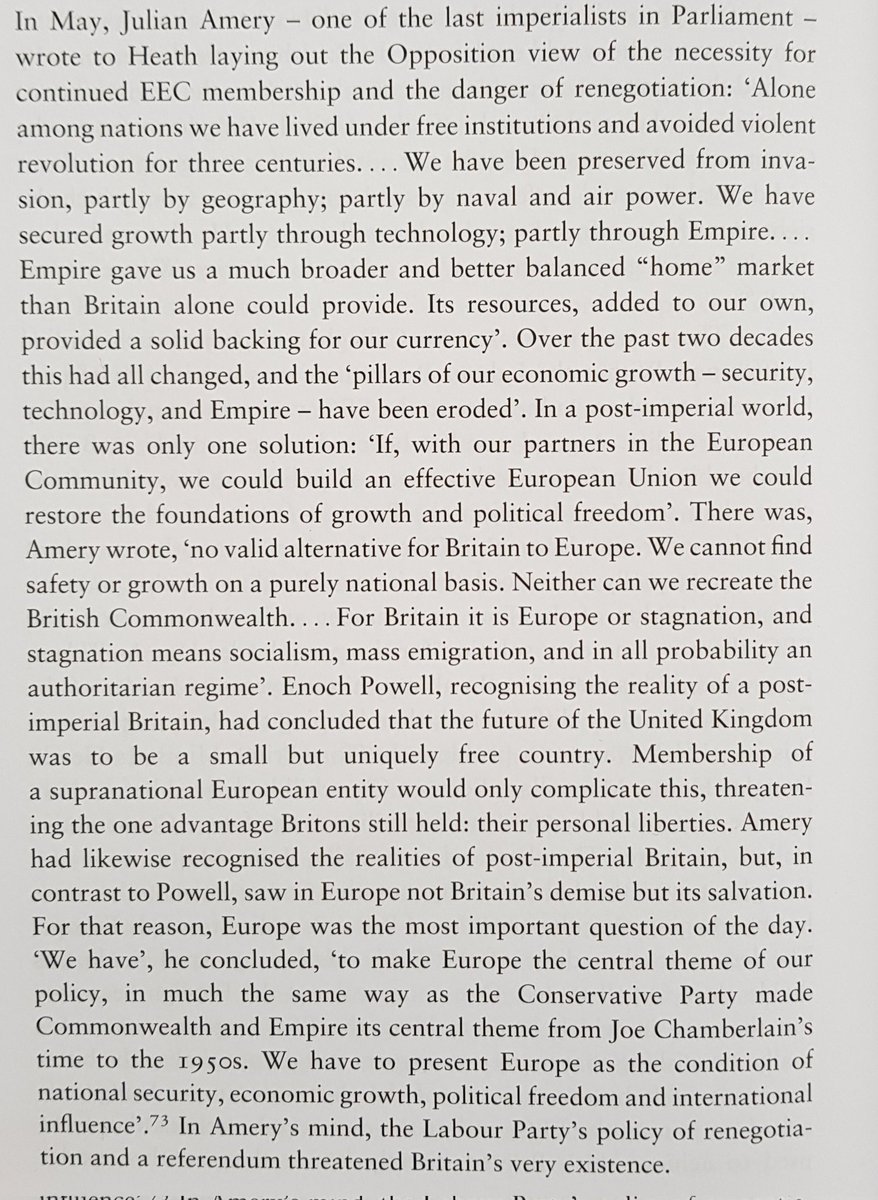From Grob-Fitzgibbon's Continental Drift.
This also catches the eye regarding the argument (in 1948) about a European Customs Union versus "the old days of free trade", the latter being "a relic of a world which has disappeared probably never to return". 

"In every respect we in Britain are closer to our kinsmen in Australia and New Zealand...than we are to Europe. We are closer in language and origins, in social habits and institutions, political outlook and in economic interest."
– Labour Party NEC statement, June 1950.
– Labour Party NEC statement, June 1950.
Or Dan Hannan, 2015-2021.
On Winston Churchill's cooling towards European Union shortly after becoming prime minister again in 1951. 



The moment in 1952 when Britain began to see the 'Schuman Six' as 'Little Europe' [a term modern eurosceptics would later deploy when accused of only wanting 'Little England']. The Churchill Govt's answer was to draw back from the enterprise. 



Note the 'Commonwealth Scandinavian Movement for European Unity', a spiritual forerunner to EFTA. Remember this is supposedly a very pro-European Conservative govt under Churchill. 

None the less, the outlines of Britain's tragedy and "grim choice" (as Harold Macmillan would much later describe it) were already coming into view.
"Bit by bit we shall be driven back into our island where we shall starve."
"Bit by bit we shall be driven back into our island where we shall starve."

In June 1956, Anthony Eden ordered an official review of Britain's place in the world, which made sobering reading. 





Douglas-Home again - the original eurosceptic.... apart from Bevin, Churchill and Eden, to name but three. 

Peter Thorneycroft, the anti-Cakeism pro-Europe man, up against Alec Douglas-Home, the CANZUK Atlantic Eurosceptic outrider/upstart.
"Only Lord Home remained unhappy"...
"Only Lord Home remained unhappy"...

Except the reality was that they were all cakeists and eurosceptics, Plan G itself being a large slice of Cake waiting to be eaten.
Cakeism was just a matter of degree.
Cakeism was just a matter of degree.
And so on we go to the govt's "greatest achievement of 1957"... getting widespread support for its European FTA idea, meaning Britain could stay outside the Treaty of Rome but enjoy/advance 'free trade' across Europe. Cakes all round.
An early "Love Europe, hate the EEC..."
An early "Love Europe, hate the EEC..."

Except that De Gaulle chap then turned up in 1958 and French opposition to such an FTA continued/deepened.
The then PM Macmillan lost patience and was prepared to dig in against "Little Europe".
The then PM Macmillan lost patience and was prepared to dig in against "Little Europe".

The free trade plans of "Global Britain" fall apart and a trade war looms with the Treaty of Rome countries, causing Britain to believe 'Europe' will now collapse. All in 1958.
Plus ça change, right?
[This event was quickly followed by the talks that eventually created EFTA.]
Plus ça change, right?
[This event was quickly followed by the talks that eventually created EFTA.]

Just keep reminding yourself that these 'eurosceptics' were arguably the most pro-European politicians in Britain. Churchill's heirs.
Meet Sir Frank Lee, a senior civil servant, who in 1960 was key to nudging the government towards applying for EEC membership.
Feel the trepidation, though.... "a near-identification with the Common Market".



Feel the trepidation, though.... "a near-identification with the Common Market".




For what it's worth, this is where I suspect the author may go wrong – by, of all things, quoting the Daily Mail.
In my opinion, Britain rejected EEC m'ship because she rejected a higher supranational authority of this nature.
Reality dragged her kicking & screaming to apply.

In my opinion, Britain rejected EEC m'ship because she rejected a higher supranational authority of this nature.
Reality dragged her kicking & screaming to apply.

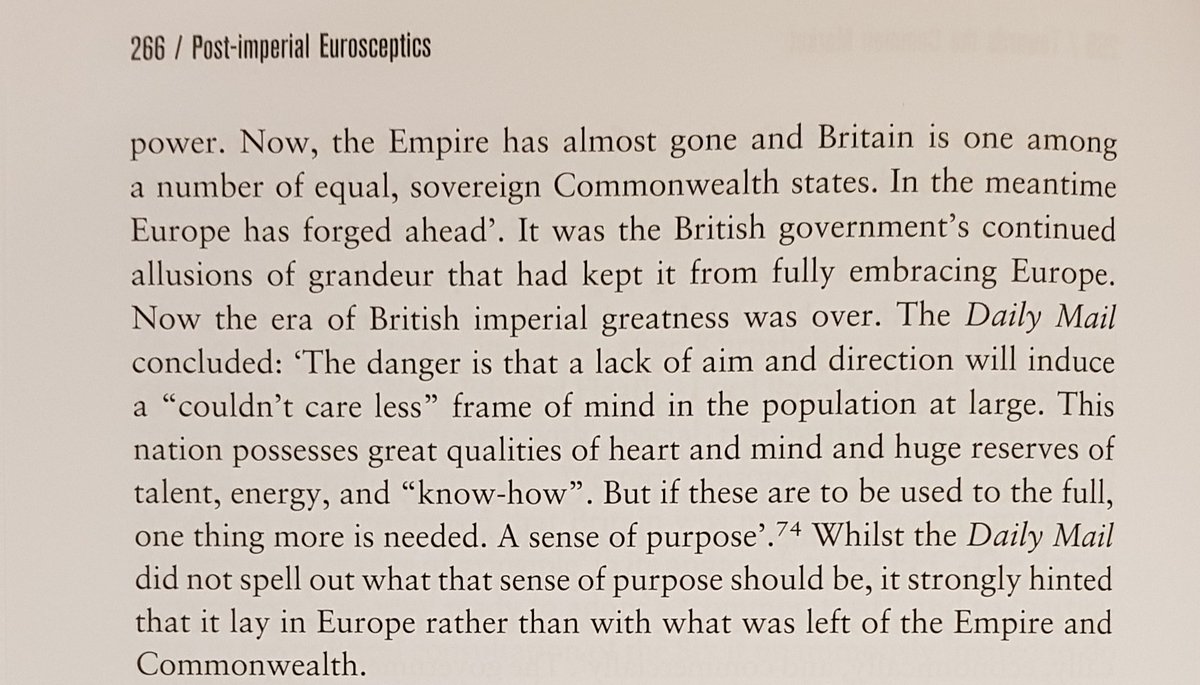
The history of this post-war period is littered with UK worries about Euro-supranationalism – about a federation in the making. Such worries were always at the core of British euroscepticism – 'sovereignty' vs geopolitical reality. Sound familiar?
Anyway, on we go...
Anyway, on we go...
Britains first application to join the EEC was riddled was grudging doubt. When Macmillan told De Gaulle of UK intentions, it was that Britain was "not opposed to joining in political consultations with the six."
"Not opposed". It doesn't set the pulse racing, does it?
"Not opposed". It doesn't set the pulse racing, does it?

But then Churchill's heirs had been dragged here by circumstance. Even the most pro of British pro-Europeans started having second thoughts about it all. Very Churchillian. 

No wonder De Gaulle said 'Non' at the start of 1963. British hearts & minds were not really in it.
Anyway, a Conservative MP, Edward Boyle, described the two camps in the increasingly polarised 'Europe' debate of 1961.
Same old same old, one might say.
And yes the Daily Express was viscerally 'anti-European' in 1961.
Same old same old, one might say.
And yes the Daily Express was viscerally 'anti-European' in 1961.

And so we arrive at a key point in history and in this book: the rise of the anti-marketeers.
And what was at the very nucleus of their case against?
Sovereignty, of course.
As always.
And what was at the very nucleus of their case against?
Sovereignty, of course.
As always.

While anti-marketeers mobilised, Macmillan set out his stall of a non-integrationist, anti-federalist, "global Europe". Nigel Farage would have nodded in approval. 


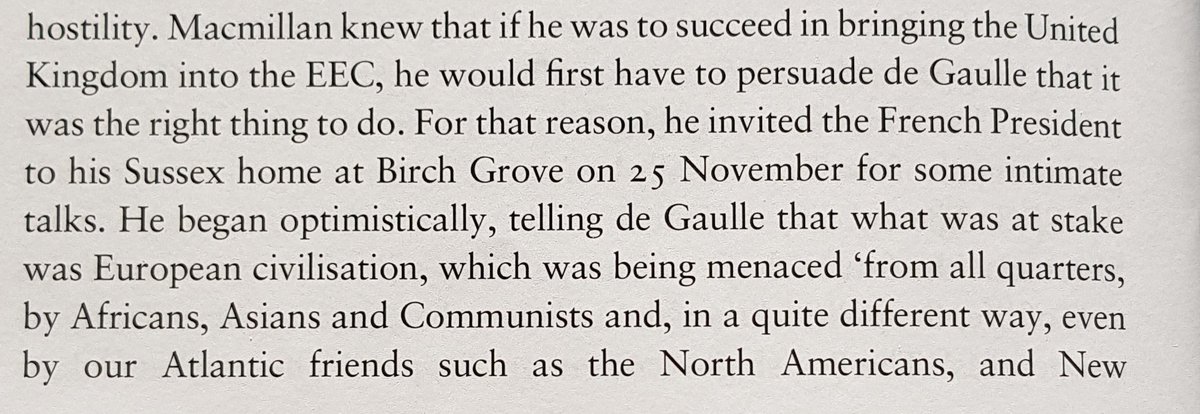

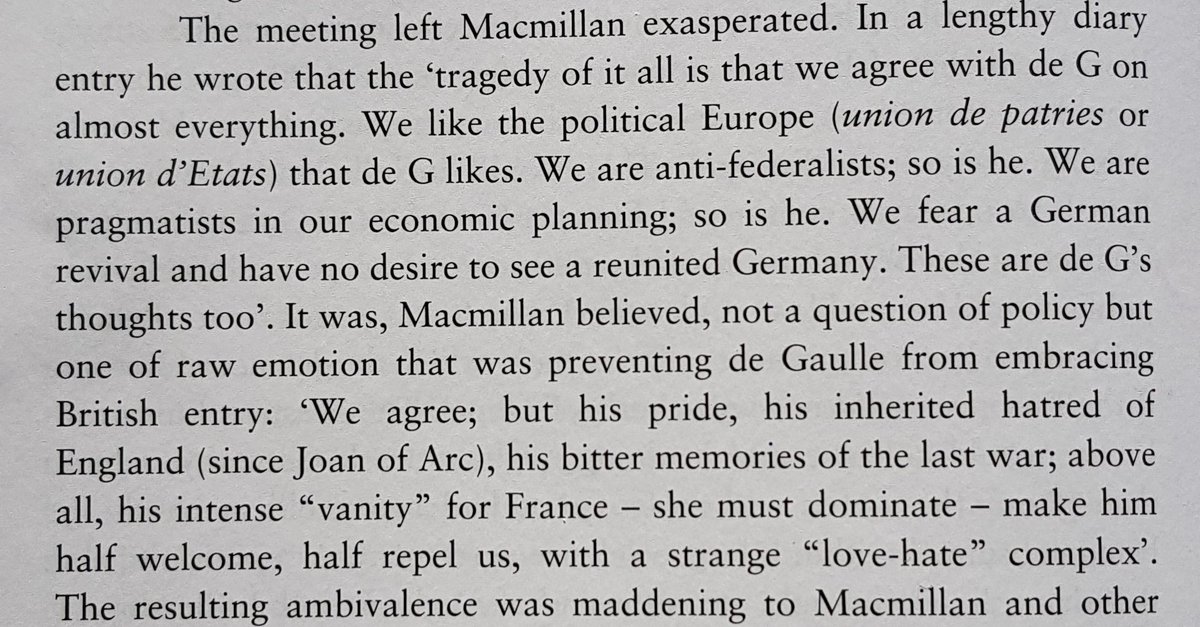
Sadly for Macmillan & the view that this was largely a trading arrangement, Jean Monnet also set out his stall. It wouldn't be the last time a continental EU enthusiast 'put his foot in it' and stoked British scepticism. It smelt to sceptics like a 'great deception' was afoot... 

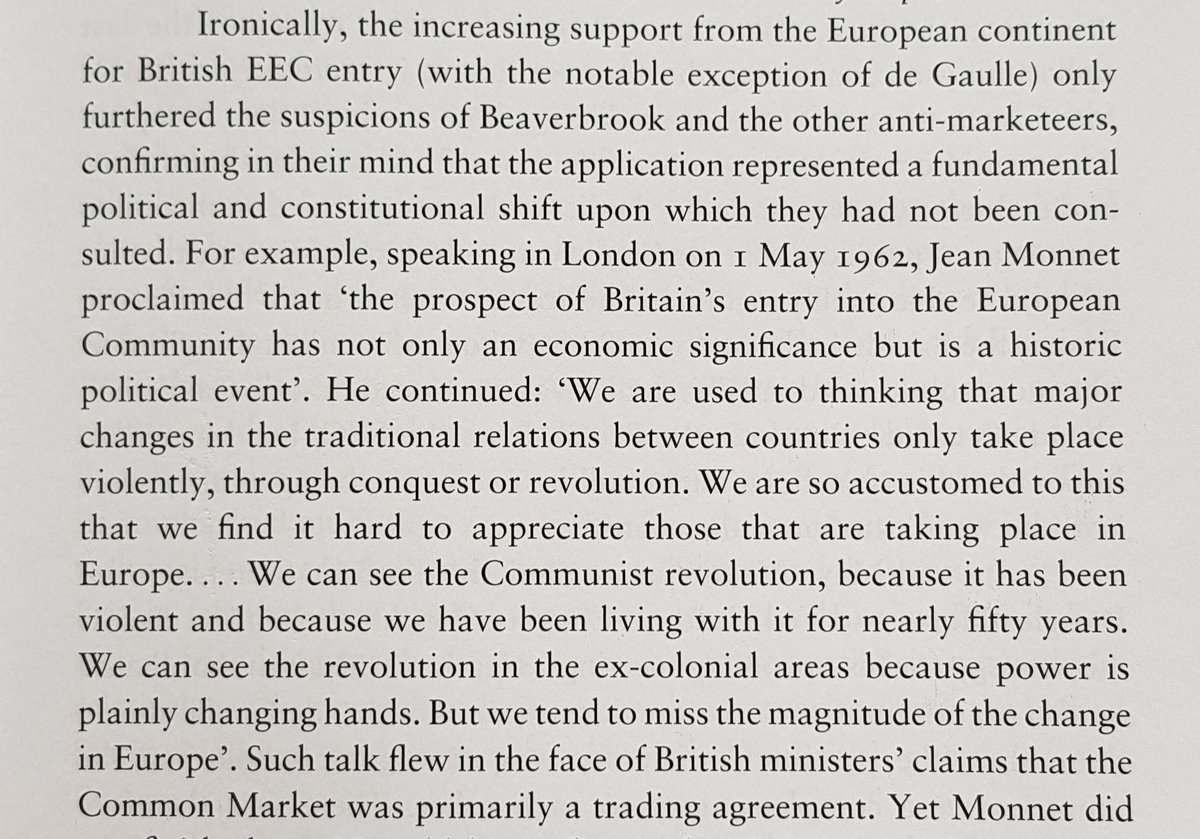

Meanwhile, the Churchillian pro-Europeans continued to desert the European Movement. They had never wanted anything to do with a federal structure. Rhys-Williams turned full anti-marketeer. 



Hurting the Commonwealth was up there among Labour's concerns but so was "the end of Britain as an independent state...the end of a thousand years of history" (Labour leader Hugh Gaitskell).
So sovereignty again, and the worry about being absorbed into a country called Europe.
So sovereignty again, and the worry about being absorbed into a country called Europe.
Labour formed a govt in 1964, more than a year after De Gaulle's famous 'Non', and very gradually Wilson's Govt moved from eurosceptic to being pro-EEC entry. Another 'Non' from De Gaulle in 1967, then an economic crisis, and soon 'Global Britain' was in radical retreat. 
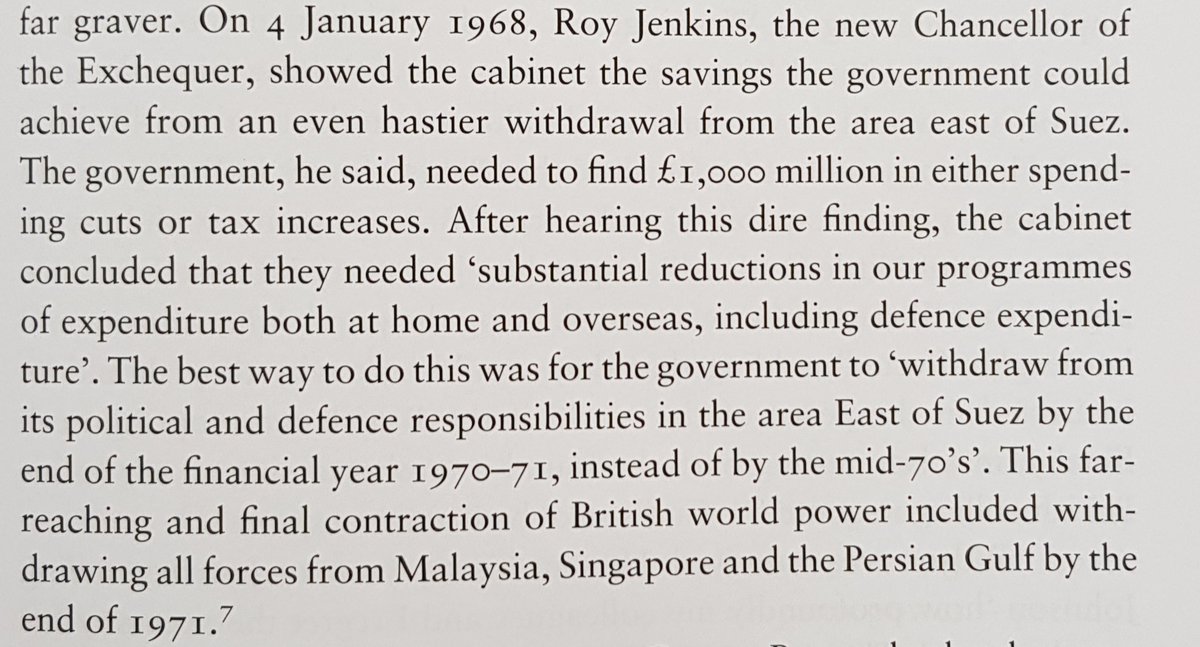
Britain was becoming desperate. Then De Gaulle, facing pressures of his own, softened towards Britain and suggested an entry deal where he would ally with the UK to turn the EEC into a loose, non-federal free trade area or 'European Economic Association'.
Or 'EEA' for short.
Or 'EEA' for short.

The details of that conversation later became contested and Britain & De Gaulle fell out yet again.
But very soon after that, De Gaulle lost a domestic French referendum and resigned.
The referendum result?
52% - 48%.
But very soon after that, De Gaulle lost a domestic French referendum and resigned.
The referendum result?
52% - 48%.
The other EEC five had always favoured Britain joining. De Gaulle alone blocked Britain for a decade. He had infuriated British PMs and boosted British sceptics. Post-2016, the Remain sphere now wonders if he was right.
During the 1960s, De Gaulle was the anti-marketeers' protection blanket so his resignation prompted a ramp-up of British anti-EEC campaigning. It was about the 'F' word and increasingly a referendum. 

1969/1970 was when Enoch Powell established himself as a leading anti-marketeer but there are better narratives about Powell than Grob-Fitzgibbon's. E.g. "Enoch Powell: Politics and Ideas in Modern Britain
by Paul Corthorn" and this must-read review...
lrb.co.uk/the-paper/v41/…
by Paul Corthorn" and this must-read review...
lrb.co.uk/the-paper/v41/…
Powell's brand of 'free trade' (and anti-immigration) Tory Brexitism has run through so much since. By way of an aside, here he is at the Newbury by-election in 1993, supporting UKIP's founder. A young swooning 20-something called Nigel Farage drove Powell to the venue. 

Anyway back to 1971, and the UK gets its first overtly eurosceptic party – a party for UK Independence.
But they didn't call it the UK Independence Party because it already had a name....
The Labour Party.
But they didn't call it the UK Independence Party because it already had a name....
The Labour Party.
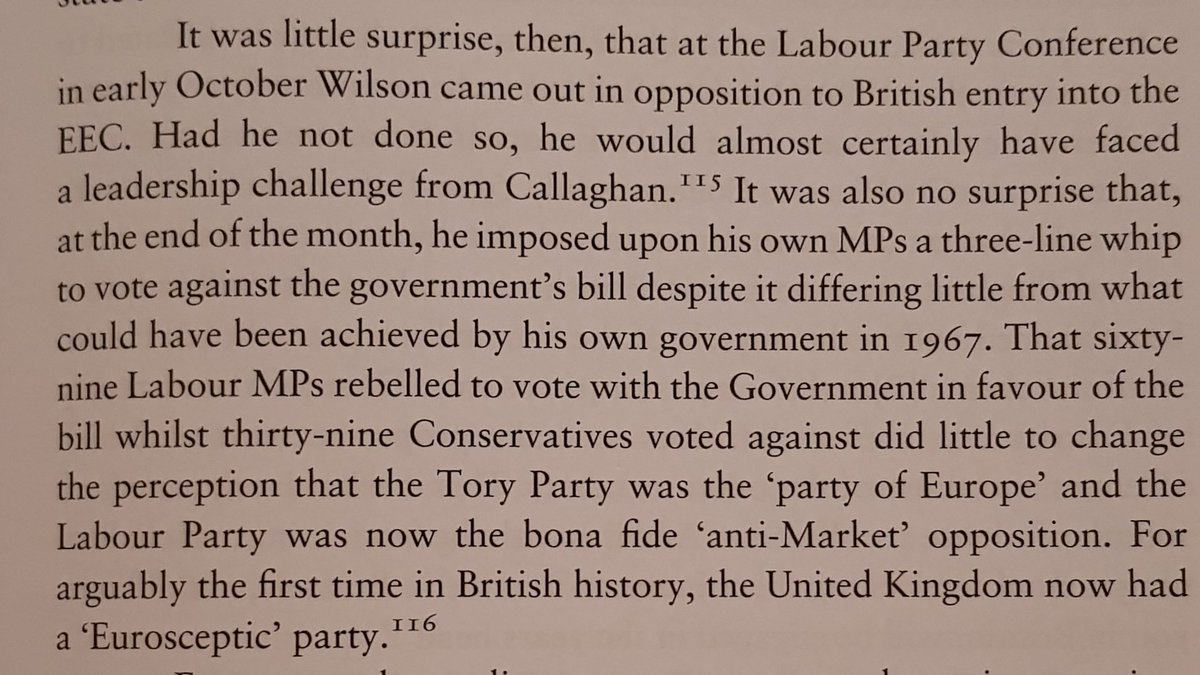
But Britain finally did join. Not in triumph but, on some views, with "wary acceptance. It even appeared a kind of surrender..."
So not exactly whole-hearted then.
So not exactly whole-hearted then.

Eight months after joining the EEC in 1973, an opinion poll reported that a majority of the public thought the government had been wrong to take Britain in.
(Narrator: The 'majority' was 52%)
(Narrator: The 'majority' was 52%)
These passages hint at another angle: that the old imperialists were being drawn to the EEC. By contrast Powell, who famously spurned all imperial remnants as the empire folded, turned away from the EEC.
Benn: "The myth of Empire had been replaced by the myth of Europe".

Benn: "The myth of Empire had been replaced by the myth of Europe".


The Amery money quote was this...
To "make Europe the central theme of our policy, in much the same way as the Conservative Party made Commonwealth and Empire its central theme from Joe Chamberlain's time to the 1950s".
Is this why pro-Europeans obsessed about leading Europe?
To "make Europe the central theme of our policy, in much the same way as the Conservative Party made Commonwealth and Empire its central theme from Joe Chamberlain's time to the 1950s".
Is this why pro-Europeans obsessed about leading Europe?

In other words, was it the pro-Europeans who were "harking back to empire", not the Brexiters?
An intriguing thought but let's move on...
An intriguing thought but let's move on...
The 1975 referendum. And look: there's a female Tory leader who supported Remain but not with any passion at all and later became very eurosceptical.
The parallels with a certain Mrs May are obvious.
And possibly Jeremy Corbyn too.
The parallels with a certain Mrs May are obvious.
And possibly Jeremy Corbyn too.

On this account, not only was Mrs Thatcher apparently rather lukewarm about the EEC in 1975 (despite the famous flags jumper), so was the Labour prime minister who called it.
Reality was still dragging everyone forward, except possibly Heath who was one of the few believers.
Reality was still dragging everyone forward, except possibly Heath who was one of the few believers.

Switching briefly to book review mode, it feels like the author is running out of steam here. Maybe he felt he'd largely made his point? There was little on Heath's first year in the EEC (interesting) and little depth on the referendum itself. You'll need other books for these.
Thatcher landed in Number 10 in May 1979. She read and commented on her incoming briefing.
Like her political forebears, she wanted much less supranationalism, more loose coupling and more national 'accommodations' within the EEC.
No 'rah rah for Europe' here.
Like her political forebears, she wanted much less supranationalism, more loose coupling and more national 'accommodations' within the EEC.
No 'rah rah for Europe' here.

In fact, remember the intriguing hypothesis several tweets ago that the EEC could even be a replacement/proxy empire in a British pro-European 'harking back' mindset .... well, it was Thatcher who came closer than anyone to suggesting this in a speech in 1977... 
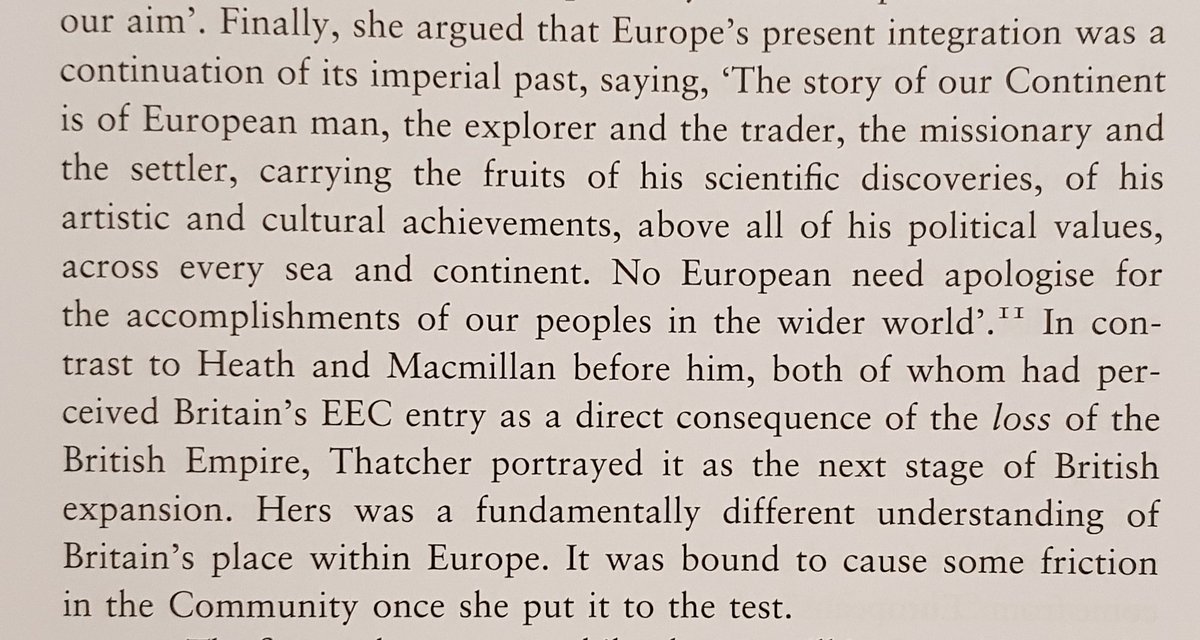
In the late 1970s, all the signs were there of future fundamentalist clashes between Thatcher and the EEC's integrationists, federalists and harmonisers.
(The screen grab refers to a 1979 speech but it could have equally been delivered in Bruges in 1988...)
(The screen grab refers to a 1979 speech but it could have equally been delivered in Bruges in 1988...)

The book rattles through the Thatcher and Major years, then concludes.
I'd certainly recommend reading 'Continental Drift' – readers will find plentiful euroscepticism from the 1940s onwards. For those who think euroscepticism is recent & shallow, the book will seem revelatory
I'd certainly recommend reading 'Continental Drift' – readers will find plentiful euroscepticism from the 1940s onwards. For those who think euroscepticism is recent & shallow, the book will seem revelatory
But I dont agree with the book's unconvincing conclusions, linking empire to euroscepticism...which was the main purpose of the book. It also skips past certain events/topics that other books explain better.
Still, get a copy. Xmas is coming....
Still, get a copy. Xmas is coming....
• • •
Missing some Tweet in this thread? You can try to
force a refresh










